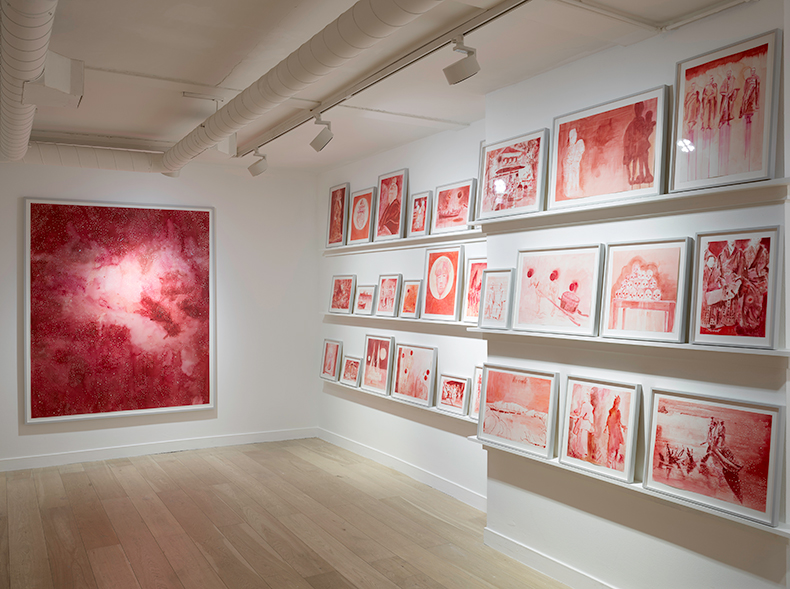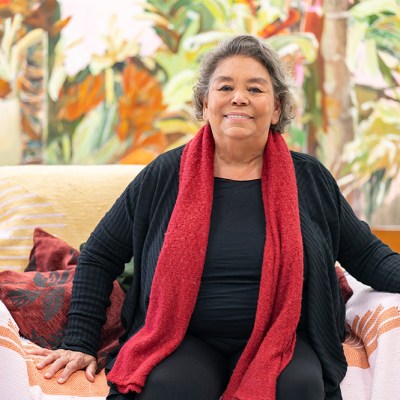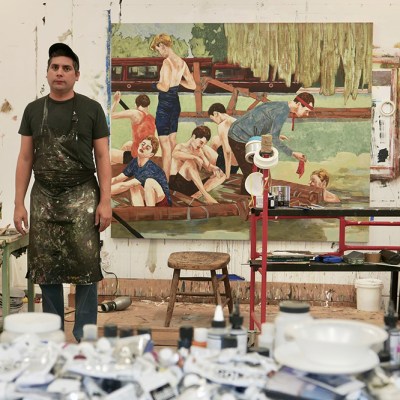The Swiss artist Uwe Wittwer appropriates found imagery, primarily drawn from the depths of the internet, to create paintings that explore notions of authenticity and collective memory. For his latest exhibition, ‘The Mission’ at Parafin in London, he has focused his research on the archives of the Imperial War Museum and the photographic collections at the Pitt Rivers Museum in Oxford – in particular, the latter’s holdings of stereoscopic images taken by A. Robert Hottot (1884–1939), a French explorer and collector who made three expeditions to Africa in the early 20th century. The exhibition includes a series of more than 50 monochromatic watercolours based on Hottot’s photographs. Other works evoke the theme of transition through the recurring figure of Charon, the ferryman who in Greek mythology transports souls across the Styx and the Acheron, the rivers that separate the lands of the living and the dead.
Where is your studio?
My studio is in Zurich, Switzerland, in an old factory building on the third floor. The factory is now used as a library for the blind. It’s interesting for me as a visual artist because there are quite a few blind people working in the space. From time to time they come into the studio and I have to explain what I’m doing, which is unusual. It’s a braille library and they also do book recordings – as a blind person you can order any book you want.
Do you have a specific studio routine?
I am a very regular person in my studio. I start work in the morning at around 8am, Monday to Friday. My assistants come in a bit later, so I have the whole space to myself for a while – it’s perfect. I start by wandering around, looking at what I have done the day or week before. Most of the time I have to go back and rework it. But that’s the daily routine as an artist – you have to rework what you’ve done.
I like working during the daylight because I’m not keen on artificial light. My working days during the summer are longer than during the winter for that reason. My studio is quite a big space, so I have the opportunity to split up the techniques I use between the rooms. There are four rooms in total – one room is dedicated to oil painting, there’s one where I do all of the works on paper, watercolours and drawings, then another where the studio manager works, and a small photo studio where we do all the documenting of the works.
Installation view of ‘Uwe Wittwer: The Mission’ at Parafin, London. Courtesy Parafin.

Do you listen to anything while you’re working?
It’s generally very quiet. When the whole team is here, there’s no music at all. When I work on my own, which is three or four days a week, I sometimes listen to music but I never listen to spoken recordings, such as podcasts.
When I start a new piece, when there’s a blank canvas in front of me, I can’t listen to music because to start a painting you need full energy to make the first brushstrokes. It’s only later on in the process that I listen, when I have already done a lot of the work.
Is there anything that frustrates you about your studio?
No, not at the moment. I’m very happy with how it is. I’ve produced two shows in the last few months: one at Parafin in London and one for Monica de Cardenas in Zuoz, Switzerland, so the studio has been full of stuff, with works everywhere. When you work on two projects, it gets complicated but then there’s a moment when the works have left and the painting studio is completely white and empty – it’s beautiful.
Installation view of ‘Uwe Wittwer: The Mission’ at Parafin, London. Courtesy Parafin.

What’s the most well-thumbed book in your studio?
One of my favourite books is Rings of Saturn by W.G. Sebald. I am always going back [to his writing]. Also everything Patti Smith has written – I have admired her all of my life. I think I have read all of her books. They’re wonderful.
Who’s the most interesting visitor you’ve had to your studio?
I don’t like to have many people here. I have gallerists visit and give regular talks about what I’m doing where we look at and discuss the work, which is very important to me. But that’s different to having collectors come by.
‘Uwe Wittwer: The Mission’ is at Parafin, London, until 4 February 2023.



